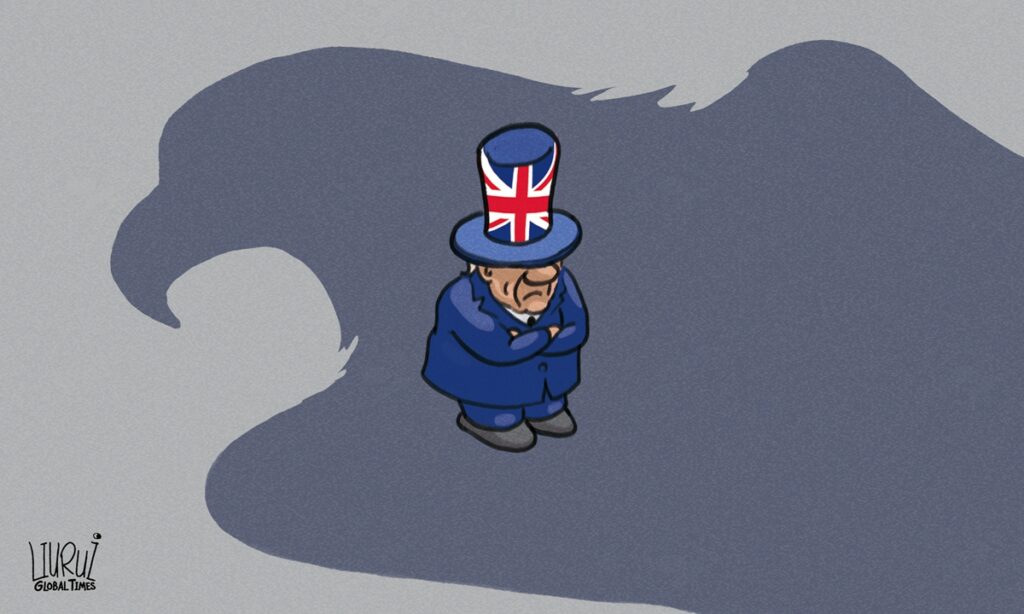With an economy clobbered by a new and more contagious coronavirus variant and increasing isolation from the European continent with the illusionary exit from the European Union, Britain needs to think deeply, with somber conscience and creativity, about how to engage with the US and China, the two powers which will have enormous implications for Britain’s future.
An unbiased balance toward the world’s two largest economies in London’s foreign policy, like what the EU has wisely pursued, will help. If London gives up its independence in decision-making and takes up a lockstep position with the US, and continues to discriminate against Chinese businesses, or even provoke China in geopolitical and military spheres, it won’t bode well for Britain, particularly the livelihood of 66 million Britons in the years to come.
Britain’s economy is in dire straits, with its 2020 GDP estimated to shrink more than 11 percent, worse than that of India and Brazil, two other major economies badly battered by the coronavirus.
The new year of 2021 doesn’t look any rosier for Britain, as a stricter national lockdown enforced by the Johnson government to stanch the new variant is set to cause a “double-dip” recession in the first quarter. A further 2-percent GDP contraction for the quarter will send the country into deep doldrums for the entire year. The country’s economy is unlikely to return to its pre-pandemic size before 2023.
Further to this, the creeping after-effects of Brexit will kick in subsequent years. Despite a last-minute trade agreement with the EU, compulsory export declarations and lumbering red tape in trade procedures in the longer term will lead to diminished British market access to the mainland, not to mention inevitable quarrelling and bickering between the two sides on trade policies.
In comparison, China’s economy has been swiftly revived after Beijing adopted highly efficient measures to largely control the virus from spreading in the country.
The $15 trillion economy – more than 5 times that of the UK’s – is expected to gain impetus and accelerate by more than 8 percent in 2021, supported by the Chinese people’s rising disposable income and growing consumption power, and the government’s penchant for constantly racking up domestic infrastructure investment to solidify growth. The economy will continue to be a major driver of the world in the coming decade, global economists have predicted.
By all metrics, Britain needs to chart a friendly relationship with China. Its infrastructure needs Chinese investment, its schools need Chinese students, its tourism resorts need Chinese sightseers, and its companies need China’s huge market.
With China and the EU reaching a historical deal on comprehensive investment at the year end, China’s financial, manufacturing and services markets are set to be further opened to Berlin, Paris, Rome, Madrid, Athens, Brussels and many other cities in the European mainland.
London ought to learn from the EU, forming a highly cooperative and mutually beneficial win-win relationship with China. A return to their past “Golden Era” of bilateral relationships is desirable, which will lead to economic windfalls of sizable proportions and hundreds of thousands of high-paying jobs in Britain.
The Trump administration’s antagonistic policy to bash Beijing politically and contain China’s rise economically in the past four years is not something that London can copy and mimic.
In the height of Trump’s trade and technology war against China, Britain made a U-turn by ousting Huawei’s advanced 5G equipment from its mobile telecom networks, despite the Chinese tech company’s strong commitment and hefty investment in the country. The decision raised eyebrows around the world, and today still makes 1.4 billion Chinese people angry, if not resentful.
To add to this, intermittently last year, some politicians in London raised the specter of sending Britain’s only aircraft carrier to the South China Sea to display its solidarity with the Trump administration. If the battleship emerges in the sea one day, it will be taken as an extraordinarily hostile move by London toward China, reigniting the flames of how this country was treated by Western colonial powers before 1900.
Britain already had the highest death toll from Covid-19 in Europe before the emergence of the new and more contagious mutation last year, which prompted London to shut down as much of the British economy as possible. Fatalities are hitting 80,000, up from 62,000 one month ago. With the economy shrinking again, the Bank of England, Britain’s central bank, will likely rack up the pace of its asset-purchase plan to shore up the financial system, and the government will keep splurging fiscally.
The country’s national debts are bubbling. In the longer term, the economy may end up being a few percentage points smaller than 2019, economists say. Exiting the EU single market has been a major mistake, it will be a blunder for London to take the side of the US government and assist Washington in impeding and holding back China, as Australia has done in the past two years. A rethink of its policy towards China is necessary.
The author is an editor with the Global Times. bizopinion@globaltimes.com.cn
Illustration: Liu Rui/GT




